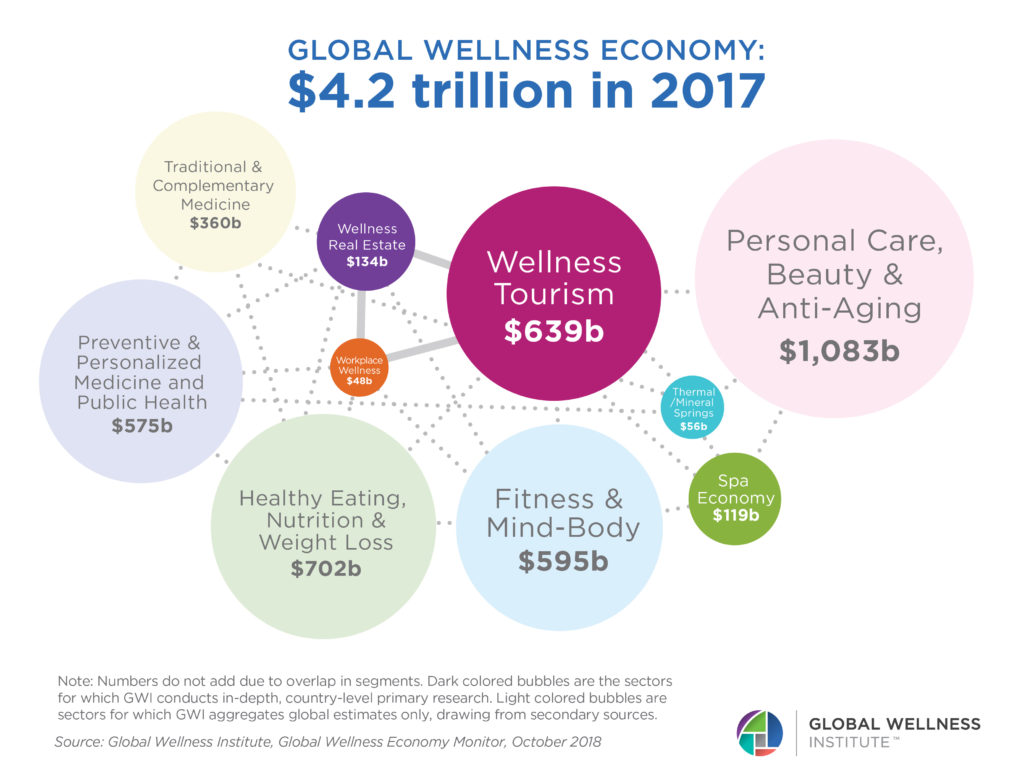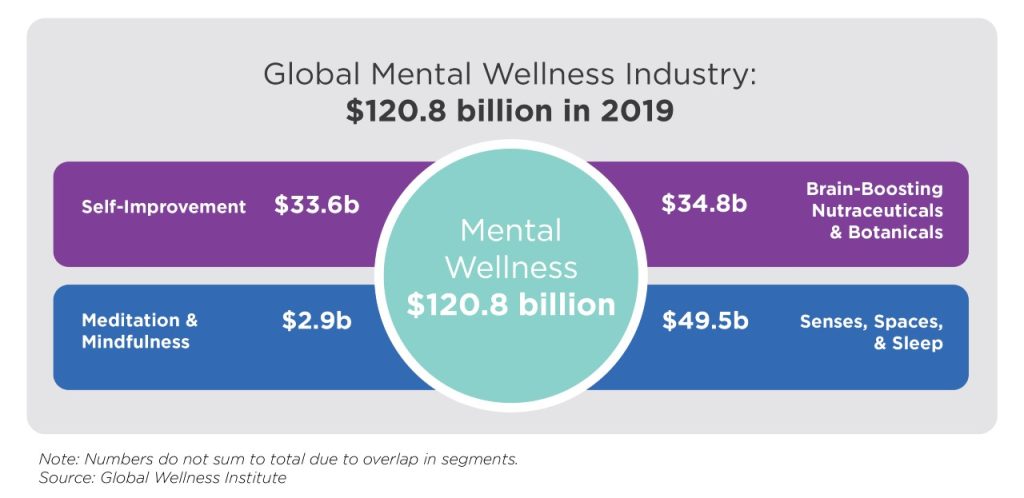Part
01
of one
Part
01
Mental Wellbeing Market Growth
The global mental wellbeing market size is currently $121 billion. Some top key players in the mental wellbeing market include Amare Global, Organika Health Products Inc., Neurohacker Collective, and Metabolic Response Modifiers.
Key Takeaways
- Mental wellness is part of the global wellness economy. The current global wellness economy market size is $4.5 trillion.
- In the past, the wellness industry primarily focused on physical health, over-shadowing the mental wellbeing and happiness segments.
- The future of mental wellness is expected to constitute high-level neuroscientists- psychotherapists collaborations, seriously mainstream meditation, new part-mind workout brands, apps tracking people's mental state.
Key Players in the Mental Wellbeing Market
Amare Global
- Founded in 2016, Amare Global is a mental wellness company that "empowers people to optimize their mental wellness and live a life full of vigor, positivity, and performance."
- Headquartered in Irvine, California, Amare Global creates an all-inclusive mental wellness platform that links a purpose-driven community of passionate people.
- According to the company's website, its vision is to lead the mental wellness revolution.
- The company's website can be found here.
- Amare Global's product segment is the gut-brain axis nutrition system. Its products are categorized into four, including Amare Fundamentals Pack, MentaBiotics, MentaFocus, and MentaSync. These product categories are designed to improve the aspects of the gut, brain, or axis for improved mental wellness.
- Amare Global's mental wellness products include energy+, mentaheart, mood+, relief+, and sleep+.
- The company's competitive advantage is its "natural products, innovative programs, and purposeful people." Amare Global prides itself on having high-quality products, programs, and people offering its clients a mental edge and lifting them to optimal performance.
- According to Growjo, Amare Global's current revenue estimate is $88.8M per year.
- Amare Global targets all individuals who desire to optimize their mental wellness. Anybody can use its product categories such as Amare Fundamentals Pack, MentaBiotics, MentaFocus, and MentaSync to get gut support, brain support, and axis support.
Organika Health Products Inc.
- Founded in 1990 and headquartered in Richmond, British Columbia, Organika Health Products educates and empowers its clients to "seek the highest quality natural health solutions for their good health and wellbeing."
- Organika Health Products is considered a player in the mental wellbeing industry because it has specialties in guthealth and stress relief, both of which directly impact mental wellness.
- Organika's website can be found here.
- According to Zoominfo, Organika Health Products Inc.'s product segments include healthcare, pharmaceuticals, drug manufacturing & research, and drug stores & pharmacies.
- Comprehensive details on Organika's wellness products can be accessed through this link.
- The company's competitive advantage is continuous research and development. According to its LinkedIn profile, Organika's innovation team depends on lab-based constant research and development, vast market research across different industries, and innovative ingredient discovery to project health-related issues and trends. This allows the company to satisfy its customers' wellness needs fully.
- According to Dun & Bradstreet, Organika Health Products Inc.'s annual revenue is $66.32 million.
- Organika targets people who desire to shop and create a tailored self-care experience to match their health needs for their better inside and outside feeling.
Neurohacker Collective
- Founded in 2015, Neurohacker Collective has a mission of using an exceptional methodology to research and development anchored on complex systems science to create "best in class wellbeing products."
- The company is a player in the mental wellbeing industry because it has specialties in nootropics and cognitive enhancement.
- According to Crunchbase, Neurohacker Collective creates the "best resources for self-directed neurological optimization" through complex systems science.
- Headquartered in Carlsbad, California, Neurohacker Collective's website can be accessed through this link.
- The company's product segment is cognition and brain health. Some of its products include qualia mind essentials, qualia mind, and qualia mind caffeine free to improve cognition wellbeing. It also offers qualia night to enhance sleep, qualia nootropic energy for energy, qualia life for longevity, and qualia immune to boost immunity.
- Neurohacker Collective's competitive advantage lies in its distinctive "methodology to research and development based on complex systems science." This scientific approach ensures support on the ability of the body to self-regulate instead of overriding regulatory systems with chemicals intended to move a biomarker in a specific direction.
- The company is a top player in the Mental Wellbeing industry because it is among the top-ranked companies in the fastest revenue growth category. According to PR Newswire, Neurohacker Collective reports 3-year revenue growth of 1119.9%, becoming a top-5-fastest growing company dealing with supplemental nutrition products.
- According to Craft, Neurohacker Collective's revenue for the financial year that ended December 2019 was $8.2 million.
- Neurohacker Collective targets the supplements for the mind (nootropic) market. It focuses on making its supplements radically different from other nootropics on the market.
Metabolic Response Modifiers
- Metabolic Response Modifiers embrace collaborative thinking and source quality ingredients to create innovative products that "support living healthy, active lifestyles."
- Metabolic Response Modifiers' website can be accessed through this link.
- The company's products fall in the sports nutrition and health supplement product segments.
- Metabolic Response Modifiers is a player in the mental wellbeing industry because it manufactures products that improve mental wellness. Its vegan options help promote mental agility. The company's therapeutic line of products helps the body recharge, repair, and refresh, leading to a "healthy and vibrant life."
- According to evitamins.com, "scientific expertise, superior ingredients, and ability to stay at the forefront of market trends and consumer needs" gives Metabolic Response Modifiers a distinct competitive advantage over other manufacturers.
- It constantly researches, innovates, and solves for new ways that holistic organic nutrition can improve people's lives.
- According to its website, Metabolic Response Modifiers indicates that "whereas others follow science, they create it." It has a passion for creating life in balance through inspiration by nature and support by science.
- According to RocketReach, Metabolic Response Modifiers' revenue is $34.20 million.
- The company's target market constitutes the sports nutrition and health supplement categories.
Mental Wellbeing Market Size
Past Market Size (Last 5 Years)
- There is no public information on the global market size for the Mental Wellbeing industry (as a whole) for different periods in the last five years besides 2019. This might be because the focus on physical health has, in the past, dominated the wellness industry overshadowing mental wellbeing. However, there are statistics for the global market size for various sub-categories in the mental wellbeing industry.
- The global mental wellbeing market size was $120.8 billion in 2019.
- In 2016, the global market size for supplements for the mind (nootropics) was $1.35 billion.
- According to GlobeNewswire, the global brain health supplements market was $3.50 billion in 2017.
- The Market Analysis Report shows that the global personal development market size was USD 38.28 billion in 2019.
Current Market Size
- The Global Wellness Institute's latest report shows that the mental wellbeing market's size is $121 billion.
- The mental wellness economy has four sub-categories, including senses, spaces, and sleep, brain-boosting nutraceuticals & botanicals, self-improvement, and meditation & mindfulness.
- Based on consumer spending, the market size for different segments of the mental wellness market is as follows:
Future Market Size
- There is no public information on the future global market size for the Mental Wellbeing industry (as a whole). However, there are statistics for the projected global market size growth for various sub-categories in the mental wellbeing industry, as presented below.
- The market size for supplements for the mind is expected to grow to $6.1 billion by 2025.
- According to Data Bridge Market Research, the global meditation market size is expected to hit approximately USD 9.0 billion by 2027, registering growth at a CAGR of 10.40%.
- According to Businesswire, the global brain health supplements market is projected to reach over $5.81 billion by 2023, registering growth at a CAGR of 8.8% for the 2017-2023 period.
- The global personal development market size is projected to grow at a CAGR of 5.1% through 2027 to reach USD 56.66 billion.
Research Strategy
We consulted industry reports, surveys, credible websites, business news articles such as GlobeNewswire, Businesswire, and PR Newswire, and reliable databases like Statistica, Crunchbase, Dun & Bradstreet, ZoomInfo, etc. to look for information about key players in the mental wellbeing market and the mental wellbeing market size. The research team found comprehensive details about top key players in the mental wellbeing market. Key players were defined as organizations whose products are widely and commonly used to improve mental wellbeing. With respect to key players, "top" was defined in terms of annual revenue and competitiveness in the mental wellbeing industry. We also found the current global market size of the entire mental wellbeing industry. The market size was defined in terms of consumer spending. Unfortunately, we could not find data for the past (except for 2019) and future market size for the whole mental wellbeing industry.
Afterward, we focused on the past market size and projected market size for the sub-categories in the mental wellbeing space. We considered mental wellbeing sub-categories such as sense, spaces, and sleep, brain-boosting nutraceuticals and botanicals, self-improvement, and meditation and mindfulness. We combed through statistical databases, credible websites, surveys, and industry reports for information about the past and future market size for these categories of mental mindfulness. The research team hoped to use statistics about the individual sub-categories to estimate the entire mental mindfulness industry's past and future market size. Regretfully, there was no public information for all sub-categories for each period in the past five years. Various sub-categories of mental mindfulness had past market sizes for some years, while data was not publicly available for other years. Equally, the expected future market size for different sub-categories varied in terms of the projected years, making it difficult to determine the forecasted prospective market size of a particular future year.
Finally, we expanded the research scope to look at the past and future market size for the entire wellness industry. We anticipated finding the past and future market size for the wellness industry broken down into various wellness industry segments, including the mental mindfulness segment, and extract statistical data relevant to the mental mindfulness segment. The research team searched through statistical databases, credible websites, surveys, and industry reports for the desired information. Unfortunately, we could not find the desired information under this strategy. Most sources found presented the wellness industry's market size over different years without breaking it down into various wellness segments.

